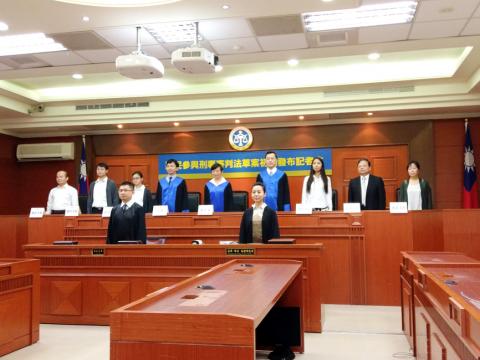The Judicial Yuan yesterday completed the first draft for a bill authorizing the public’s participation in criminal trials as so-called “citizen judges,” which received a mixed welcome from the nation’s legal professionals and judicial reform groups.
The bill, which contains 120 articles, establishes the rights and responsibilities of citizen judges on panels in criminal trials that would include professional judges.
Panels of three professional and six citizen judges would rule on criminal trials, ranging from offenses carrying a prison sentence of at least seven years to “homicide occurring in the intentional commission of a crime.”

Photo: Hsiang Cheng-chen, Taipei Times
The citizen judges would be selected at random, but they would have to be Republic of China citizens and at least 23 years old, among other qualifications.
People called to serve on the panels would receive a daily stipend and reimbursement for transportation and other expenses.
They would be forbidden from disclosing court information to the public until they have rendered a verdict or from asking for or receiving bribes in connection to their duties, or risk a prison term of less than 10 year.
The panels would require a two-thirds majority to render a guilty verdict. Should less than two-thirds agree on a guilty verdict, the panel would be required to either uphold the assumption of innocence or render a verdict in favor of the defendant.
Opening the halls of justice to the public would help educate people about the law and help the judicial system identify its shortcomings, one prosecutor said on condition of anonymity.
However, the random selection of citizen judges might result in the drafting of “rank amateurs,” a prosecutor said, adding that walking a panel through basic legal principles might add to prosecutors’ workloads.
Criminal trials could become more time-consuming, creating stress for defendants in pretrial detention and professional judges, the prosecutor said.
The bill should be seen as the Judicial Yuan’s response to the resolution of the National Congress on Judicial Reform, said lawyer Huang Di-ying (黃帝穎), deputy director of legal reform group Taiwan Forever Association.
“The bill’s conception of citizen judges is more progressive than the current judicial system, in which power is monopolized by judges, but the proposal still has room for improvement,” Huang said.
The bill would create a system that is closer to the Japanese system of lay judges than the common law system of “trial by jury” in the UK or the US, he said.
A jury system maintains a separation of powers, with jurors determining issues of fact and a judge ruling on issues of law, which is dissimilar to the Judicial Yuan’s mixed panel of citizen and professional judges, he added.
The congress voted itself into a deadlock when it tried to choose between the two systems, Huang said.
Additional reporting by Chen Wei-han

MAKING WAVES: China’s maritime militia could become a nontraditional threat in war, clogging up shipping lanes to prevent US or Japanese intervention, a report said About 1,900 Chinese ships flying flags of convenience and fishing vessels that participated in China’s military exercises around Taiwan last month and in January last year have been listed for monitoring, Coast Guard Administration (CGA) Deputy Director-General Hsieh Ching-chin (謝慶欽) said yesterday. Following amendments to the Commercial Port Act (商港法) and the Law of Ships (船舶法) last month, the CGA can designate possible berthing areas or deny ports of call for vessels suspected of loitering around areas where undersea cables can be accessed, Oceans Affairs Council Minister Kuan Bi-ling (管碧玲) said. The list of suspected ships, originally 300, had risen to about

DAREDEVIL: Honnold said it had always been a dream of his to climb Taipei 101, while a Netflix producer said the skyscraper was ‘a real icon of this country’ US climber Alex Honnold yesterday took on Taiwan’s tallest building, becoming the first person to scale Taipei 101 without a rope, harness or safety net. Hundreds of spectators gathered at the base of the 101-story skyscraper to watch Honnold, 40, embark on his daredevil feat, which was also broadcast live on Netflix. Dressed in a red T-shirt and yellow custom-made climbing shoes, Honnold swiftly moved up the southeast face of the glass and steel building. At one point, he stepped onto a platform midway up to wave down at fans and onlookers who were taking photos. People watching from inside

Japan’s strategic alliance with the US would collapse if Tokyo were to turn away from a conflict in Taiwan, Japanese Prime Minister Sanae Takaichi said yesterday, but distanced herself from previous comments that suggested a possible military response in such an event. Takaichi expressed her latest views on a nationally broadcast TV program late on Monday, where an opposition party leader criticized her for igniting tensions with China with the earlier remarks. Ties between Japan and China have sunk to the worst level in years after Takaichi said in November that a hypothetical Chinese attack on Taiwan could bring about a Japanese

The WHO ignored early COVID-19 warnings from Taiwan, US Deputy Secretary of Health and Human Services Jim O’Neill said on Friday, as part of justification for Washington withdrawing from the global health body. US Secretary of State Marco Rubio on Thursday said that the US was pulling out of the UN agency, as it failed to fulfill its responsibilities during the COVID-19 pandemic. The WHO “ignored early COVID warnings from Taiwan in 2019 by pretending Taiwan did not exist, O’Neill wrote on X on Friday, Taiwan time. “It ignored rigorous science and promoted lockdowns.” The US will “continue international coordination on infectious